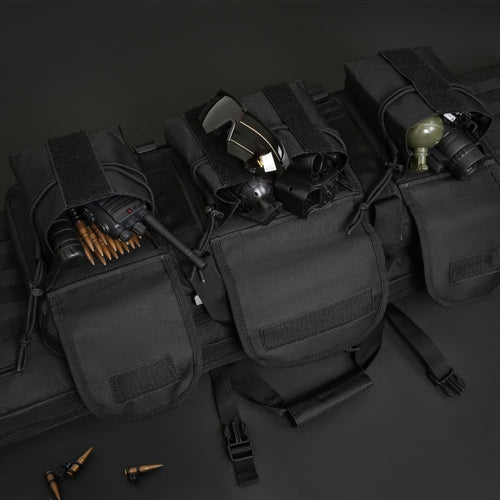
As a rifle owner, you face an important choice: soft or hard gun case? This decision affects your weapon's safety during storage and transport. Soft cases are flexible and convenient, while hard cases offer robust protection. But which option truly keeps your rifle safer? Gun enthusiasts have debated this question for years. We'll compare these cases, looking at their durability, security features, and ability to protect against environmental factors. Our goal is to help you choose the best case for your needs, ensuring your rifle stays safe at home or on the go.
1. Gun Case Basics: Understanding Your Options
Before diving into the safety debate, it's crucial to understand what sets soft and hard gun cases apart.
What is a Soft Gun Case?
Soft gun cases are lightweight, flexible containers designed to protect firearms during storage and transport. These cases typically feature durable materials like ballistic nylon and Oxford fabric, known for its strength and resistance to wear.
One of the most recognizable features of soft cases is their zipper closure system. This allows for quick access to your firearm when needed. Many models, like DULCE DOM's rifle cases, also come equipped with convenient shoulder straps, making them easy to carry over long distances.
What is a Hard Gun Case?
Hard gun cases are constructed from tough materials such as high-impact polycarbonate or reinforced polymers. Some premium models even incorporate metal reinforcements for added durability.
Hard cases come with several key features that set them apart. Lockable latches enhance security, while pressure release valves equalize internal pressure during air travel. Watertight seals keep moisture at bay, and customizable foam inserts ensure a perfect fit for your rifle.
2. Protection and Security: Soft vs. Hard Gun Cases
When safeguarding your rifle, the level of protection offered by your gun case is paramount.
Impact and Drop Protection
Soft cases offer effective protection against minor impacts and shocks. Their design incorporates padding that absorbs and distributes force, safeguarding the firearm from everyday bumps and jostles.
Hard cases excel in providing maximum protection against significant impacts and drops. Their rigid shells, often made of high-impact plastic or metal, create a protective barrier that can withstand substantial force.
Weather and Element Resistance
Soft cases provide a basic yet effective defense against environmental factors. Most are designed with water-resistant materials and coatings, offering protection against light rain and brief exposure to moisture. This feature makes them suitable for everyday use and short outdoor excursions.
Hard cases offer superior protection against harsh environmental conditions. Many models boast full waterproof and dustproof capabilities, with some even rated for submersion. This level of protection effectively shields firearms against extreme temperatures, humidity, and dust.
Theft Prevention and Lock Systems
Soft cases incorporate basic security features that are suitable for many situations. They typically use lockable zippers, which can be secured with small padlocks. Some premium models include built-in locks for added convenience and security. While the fabric construction may be vulnerable to cutting, the locking mechanisms provide a deterrent against casual theft attempts.
Hard cases offer robust security features that provide superior protection against theft. They often include multiple reinforced lock points designed for use with padlocks, significantly increasing security. The rigid construction of hard cases resists cutting and forced entry attempts, making them much more difficult for potential thieves to breach.
3. Home, Travel, and Upkeep: How the Two Gun Cases Perform
Proper storage and maintenance of your rifle are crucial for its longevity and performance.
Home Storage
Soft cases excel in versatility and space-saving. Their flexible material allows them to fit easily into compact spaces like closets or under beds, conforming to available storage areas. This adaptability, combined with their lightweight nature, makes soft cases easy to move or rearrange as needed, perfect for those with limited storage space.
Hard cases, while larger, offer superior protection for long-term storage. Their airtight seals help control humidity and temperature, preserving the firearm's condition over time. The rigid structure protects against accidental impacts or crushing, while custom foam inserts ensure secure positioning, preventing movement and potential damage. This makes hard cases ideal for gun owners prioritizing long-term preservation and security.
Travel and Transportation
Soft cases shine in everyday portability. Their lightweight design, typically ranging from 2-5 pounds, significantly reduces carrying fatigue. Many soft cases include comfortable shoulder straps for hands-free transport, making them ideal for short trips, range visits, or hunting excursions where quick access is beneficial. The ease of carrying and maneuvering soft cases makes them a popular choice for frequent, short-duration use.
Hard cases excel in rugged travel scenarios, providing maximum protection during air travel or rough handling. Many models include wheels and handles for easier transport of heavier loads, addressing the weight concern. Their stackable design facilitates efficient use of space in vehicles or storage areas, a significant advantage for those traveling with multiple firearms or extensive gear.
Maintenance Requirements
Soft cases offer straightforward care options. Many are machine washable, allowing for easy and thorough cleaning. Their quick-drying materials help prevent mold and mildew, a crucial feature for maintaining firearm safety. When not in use, soft cases can be easily folded or rolled, taking up minimal storage space.
Hard cases provide low-maintenance protection with their durable construction. The non-porous surfaces are simple to wipe clean, resisting stains and odors effectively. This durability often translates to less frequent replacement needs, offering long-term value. Additionally, the watertight seals keep the interior dry, reducing the need for frequent internal cleaning and providing peace of mind in various environmental conditions.
4. Quick Access vs. Customization: User-Friendly Features of Gun Cases
Gun cases must balance protection with ease of use. Here's how soft and hard cases compare in practical terms:
Retrieval Speed
Soft cases offer quick access. Zippers open fast, and the flexible material lets you remove your rifle easily. This speed matters in competitions or hunting.
Hard cases take longer to open. Latches and locks boost security but slow you down.
Customization Options
Soft cases have many pockets for accessories like magazines and cleaning kits. Adjustable straps fit different rifle sizes.
Hard cases shine with customizable foam inserts. You can cut the foam to fit your rifle and gear perfectly.
Portability and Weight
Soft cases are light and flexible. They're easy to carry far, often with shoulder straps or as backpacks. Hunters who walk long distances prefer these.
Hard cases are heavier but often have wheels. This helps at airports or to and from cars. However, they're harder to carry on rough ground.
5. How to Choose the Right Case: Soft vs. Hard Gun Bags
Selecting between soft and hard gun cases depends on your specific needs and circumstances.
Choose a Soft Gun Case When:
You prioritize portability and light weight. Soft cases are ideal for hunters who trek long distances or for frequent trips to local shooting ranges.
You need quick access to your firearm. The zipper closures on soft cases allow for faster retrieval compared to the latches on hard cases.
Storage space is limited. Soft cases can be easily stored in tight spaces like closets or under beds when not in use.
You're on a budget. Generally, soft cases are less expensive than their hard counterparts.
Opt for a Hard Gun Case When:
You're traveling by air. TSA regulations require firearms to be transported in locked, hard-sided containers.
Maximum protection is crucial. Hard cases offer superior protection against impacts, crushing forces, and extreme weather conditions.
Long-term storage is needed. The airtight seals of hard cases better protect against humidity and temperature fluctuations during extended storage periods.
Consider Both If:
You frequently encounter diverse situations. Many firearm owners find value in having both types of cases for different scenarios.
You own multiple firearms. Different guns may have different transportation and storage needs.
High-quality soft cases like those made with DULCE DOM's 616D Oxford fabric offer improved protection compared to standard soft cases, potentially bridging the gap for some users.
6. Choose Your Case, Protect Your Rifle
Selecting the right gun case is crucial for your rifle's safety and your peace of mind. Both soft and hard cases have their strengths. Soft cases offer portability and easy access, ideal for frequent local trips or hunters covering long distances. Hard cases provide maximum protection, perfect for air travel, long-term storage, or harsh conditions. Consider your specific needs: How often do you travel? What's your storage situation? What's your budget? Remember, many gun owners benefit from having both types for different scenarios. High-quality soft cases, like those using DULCE DOM's 616D Oxford fabric, can offer a good balance of protection and convenience. Ultimately, your choice should prioritize your rifle's safety while meeting your practical needs.
